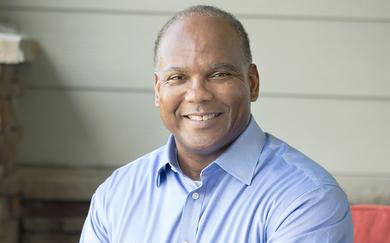Last updated on January 17th, 2022 at 12:02 pm
Kendall Qualls is United States Army veteran and business leader who is now running for governor of Minnesota as a Republican. And in his campaign he is not afraid to honestly confront hard issues; one of them is the devastation of the Black family over the past 50 years in America. In an editorial on Foxnews.com, Qualls wrote:
I was five years old when Martin Luther King, Jr. was assassinated. Then, nearly 80 percent of Black children were born into two-parent families but sadly, the Black community transformed to 80 percent fatherless homes in my lifetime. If the American Black family was a spotted owl or a gray wolf, it would be on the endangered species list.
Why is the decline of the two-parent family so devasting to the Black community? Qualls states:
We know the damaging effects fatherless homes [have on] children after seeing the steep decline of two parents in the Black community for five decades: 85 percent of children with behavioral disorders; 90 percent of homeless and runaways; young boys and girls suffer higher rates of physical and sexual abuse, and the list continues… What happened to the American Black family is not the dream King had in mind and is nothing short of a cultural genocide. It has been a nightmare for children born during this period.
Indeed, studies from the left, right, and center all say the same thing: that children generally do best when raised in a family composed of their married biological mother and father. These studies show that compared to children raised in the traditional family, children raised in never-married, divorced, and cohabiting households are significantly more likely to:
Drop out of and get left backed in school;
Suffer physical and sexual abuse;
Live in poverty;
Engage in early and more frequent sex;
Have a child out of wedlock;
Use alcohol and illegal drugs;
Get divorced as an adult; and
Earn less as an adult.
Qualls noted that unlike the Congressional Black Caucus, he does not believe that racism is the main culprit for many of the problems in the Black community:
In 2021, the Congressional Black Caucus (CBC) celebrated 50 years. On their website they state, “While we have come a long way, African Americans continue to face racist and discriminatory policies and institutions that result in disparities across almost every facet of life, from access to quality affordable health care and education, to police brutality and voter suppression.”
The disparities the CBC references are not a result of racism. Ninety percent of the problems in the Black community can be attributed to the fatherless home crisis. Nowhere does the CBC reference the decline of two parent families and its impact on women, children, health, or education. The reason they hide this is sorrowful and treasonous to their communities and the country.
And a main driver of the decline of the Black family, Qualls writes, was the creation of the welfare state as part of President Johnson’s failed war on poverty:
Many of these elected and local community leaders promoted and/or sustained a welfare dependency class with Aid to Family with Dependent Children (AFDC) that tripled in enrollment from 1 million in 1962 to 3 million in 1972. By 1994, 66 percent of AFDC recipients were never married families while in 1975 it was 33 percent. The trends continue with many inner cities experiencing 85 to 90 percent unwed births in the Black community. We have operated for decades as if this has no impact on social norms.
Ironically, Qualls notes, one of the biggest beneficiaries of racial progress in America are Black immigrants, who have higher rates of two-parent families. He writes:
One the largest and most interesting benefactors of the civil rights movement are Black Americans that have legally immigrated to the U.S. from Africa (non-refugees) and the Caribbean Islands. They see the country much differently than native born Black Americans and based on the U.S. Census their children grow up in higher levels of two-parent families. Because they see America as a land of opportunity and haven’t been indoctrinated by years of anti-white, anti-capitalism and anti-American propaganda, they earn significantly more in household income and are more educated than those who are native-born.
So what can be done to improve the situation in the Black community? Qualls declares:
[T]o make a systemic change worthy of the sacrifices by civil rights leaders, a wholesale cultural transformation is needed from the Black community from the bottom up, starting with a re-dedication to two-parent families, a return to the principles of the Christian faith and recommitment to education. These efforts need universal support taught to children from parents, grandparents, pastors, fraternities, and sororities.
And despite the dire situation, Qualls is remains hopeful. He concludes: “We are not going to be the generation that lost America. We are going to be the generation that saved it, restored it, and passed it on to the next generation.”
Kendall Qualls is a Republican candidate running for governor in Minnesota who is not afraid to tackle head-on one of the main drivers of distress in the Black community: the breakdown of the family. Indeed, he convincingly argues that it is the breakdown of the Black family over the past 50 years, rather than racism, that is causing so much harm to the Black community. If the married mother-father family can be restored, the Black community will be able to solve many of its woes. This is a message that not many people, especially the leaders of the Black Congressional Caucus and liberals in general, will want to hear. But it is a message that needs to be heard and acted upon.
